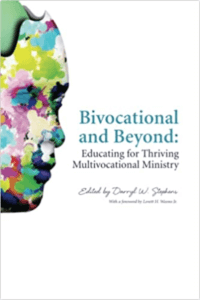Can bivocational ministry be a strategic choice and not just a reluctant concession to financial constraints? Ann Michel of the Lewis Center staff interviews Ben Connelly about how bivocational ministry can enhance collaboration, deepen engagement with the mission field, and even promote the personal spiritual growth of bivocational ministry practitioners.
Listen to this interview, watch the interview video on YouTube, or continue reading.
Ann Michel: Many people think neither a pastor nor a congregation would choose bivocational ministry unless they had to. It’s a reluctant choice often made out of financial necessity. But others see bivocational ministry as a strategic choice. Could you describe what that looks like in the faith community you serve?
Ben Connelly: In our Western, still coming-out-of-Christendom context, the standard for church work is that it’s full time. But in a lot of places around the world that’s not true. And it hasn’t necessarily been true through history, either. Yet full-time ministry certainly has been the norm for us, even if it hasn’t been the norm globally and historically.
I stepped into bivocational ministry when we planted a church. I didn’t want to put the whole burden of finances on our brand-new, little church plant. Of course, church planting is risky in a lot of ways. So, one way I chose to mitigate some of the risk was to take a bivocational job. I taught at a local university.
And even though my initial motive for becoming bivocational was financial, all of these other really sweet things started happening. I was able to engage a mission field. Having limited time and a “split week,” if I can say it that way, formed me spiritually. While intentionally pursuing bivocationality, I personally experienced some unique benefits and a whole lot of God’s grace.
Ann Michel: In your church context there are many people serving bivocationally. Can you describe what that looks like?
Ben Connelly: At our church only two of us are paid at all. I’m paid for a day or a day and a half a week. And another person is paid for a day or a day and a half a week to carry some of the day-to-day operations and ministry load. But then we have a team of five or six folks who are able to give three, five, eight, ten hours a week. So, we have essentially a bivocational leadership team that would be more than a full-time person or two full-time people. Everybody brings their best to the table. This feels unique in some ways, but I think there would be folks in many of our churches who could offer something in their specific area of gifting or passion for five, six, ten hours a week. But a lot of times they don’t know they can. They’re not given the permission.
Ann Michel: Are these paid roles or volunteer leadership positions?
Ben Connelly: Some are paid, and some aren’t. We have a little bit of a hybrid. But we’ve chosen not to focus a lot on the distinction between staff versus non-staff. Instead, we focus on the fact that everyone has some spiritual gifting and ask what it would look like if we all brought our best to the body of Christ.
Ann Michel: You’ve mentioned some of the benefits you experience as a bivocational minister. Could you speak to that a bit more?
Ben Connelly: First, there has been some freedom for our churches to use finances differently. I planted a church 12 years ago and was bivocational the entire time. And then we planted another church about a year and a half ago, also serving bivocationally. And in both churches, we’ve been able to use some of the finances to bless our neighborhood, to help folks in need in our community, and connect to our mission field. We wouldn’t have as much capacity for this if somebody was pulling a full-time salary. So, there’s a financial benefit not just for me as the planter, but for the church to “use God’s money for God’s mission.” This is how we talk about it.
But there are also some spiritual implications, too. It takes a lot of humility to say, “I don’t have the literal capacity in a given week to carry everything that a church or ministry needs.” And with this comes a reliance on others, and a reliance on the Spirit to do what only God can do. It’s a laying down of self, in some ways. It’s a really beautiful limitation to know that no minister, no person, is good at everything. I have to, or get to, express it in a glass-half-full way — stay within the lanes of my own gifting and then entrust some of the ministry and mission to others who I know are gifted but who might do it a little bit differently than I would.
Ann Michel: In a chapter you contributed to the book Bivocational and Beyond, you share the results of some research that discovered that bivocational ministers often experience this kind of personal spiritual growth. Can you explain a little bit about what you learned and why you think it’s important?
Ben Connelly: Our survey collected hundreds of pages of data from bivocational ministers. And nobody said, “I want to be bivocational for my own spiritual benefit.” The reasons were always practical or even missional. It was always finances, whether church or personal finances, or stage of life, like they were working through school. Or they wanted to be bivocational so they could be in the world and not just be walled away in the church.
But what almost all of them found is that being bivocational formed them spiritually. They found it personally sanctifying along the lines I’ve already mentioned. Humility and dependence and the need for a team grew, which is also to say I can’t do everything on my own. I need others. It was also sanctifying to say there’s not a separation between the holy and the unholy parts of my life. As one person said, “By living incarnationally and having a job in the ‘secular world,’ I’m practicing incarnational living like Jesus did.” Another person said, “It reminds me of what everybody else in my congregation experiences.”
Ann Michel: Many say there’s no such thing as part-time ministry. I know that isn’t true, but how can people serving part-time or bivocationally set reasonable boundaries around what’s expected of them and what they expect of themselves?
Ben Connelly: That’s a key issue in the results of our survey and even in my own experience. I know my wife would definitely tell you this. For the ministers we work with, time is the big question. But I don’t think that’s true only for bivocational ministers. I know it’s true for professors. I think it’s true for anyone outside of shift work where you clock-in and clock-out. Even then, I think it’s still tough to say, “Okay. I’m turning it on. I’m turning it off.” I don’t know if that was true 30 years ago before we were as connected as we are today. But, certainly, in today’s world everybody is pulled toward overwork. And there can even be some shame if you’re not working or if you’re spending time with family or having a life.
What’s really interesting is that some bivocational ministers say when folks in their congregations know they have another role, they are actually more respectful of their time. A congregation generally responds well if the bivocational minister overtly says, “Hey, I have these days of the week to give to the church and the others are working on cars or serving coffee or being a consultant or teaching or whatever else.” Sometimes, it’s the full-time ministers who have a harder time turning it off because, in their own expectations or the expectations of others, the idea is that a pastor is available 24/7.
Going back to the personally sanctifying aspect of this, if a person can’t get hold of you because you’re at work, they can call a small group leader or just a fellow follower of Jesus and that person can help walk them through whatever issue. And that’s really beautiful. That’s the priesthood of all believers. It’s what we want to see happen. Yet, for a lot of ministers, it challenges their very identity. There some sanctifying moments in asking, “Is my identity in my role? Or am I able to celebrate that we’ve equipped the saints and they’re doing the ministry?” It’s beautiful theoretically and biblically. But sometimes it’s hard.
Ann Michel: What are some other common challenges or pitfalls you find with the bivocational ministers that you train and coach?
Ben Connelly: Time really truly is the biggest one, figuring out where that boundary is and what the balance is. I think a subset of that is figuring out what type of second job or perhaps first job fits well. Jobs that are more flexible or where you have set shifts and jobs that are more people oriented typically fit well with bivocational ministry.
Also, some church leadership roles and demands can be more flexible, and some can’t. I can write a sermon at 11 p.m. if I need to. But it’s hard, if not kind of shady, to say, “Hey, I’ll meet you for counseling at 11 p.m.” In the first church we planted, we realized we needed a full-time staff person in a shepherding or counseling role. You need to recognize that there might be a time or a season or some specific types of ministry that are harder to navigate if you’re bivocational.
Ann Michel: In many sectors of the church today, congregations that have relied on full-time clergy for decades are moving to a part-time or bivocational model, often as a consequence of declining membership. What would you suggest to congregations or individuals who are having to shift their mindset and reframe their expectations for how ministry is carried out?
Ben Connelly: One way to frame it is to acknowledge that this puts us more in line with historical and global Christianity. This summer, I was in Australia for three weeks and worked with probably 80 to 100 different ministers in a few different cities. I met only one that was in full-time ministry. I know this isn’t true of every single minister in Australia, but it is true of those that we worked with. And I think that’s telling.
Especially in countries where the context is more post-Christendom, this is undeniably where we’re headed. But what we’re stepping into is more the norm outside the U.S./North American context. We’re headed in a direction where the church has to be a more like a movement and less like an institution. We have to reclaim more of a disciple-making ethos and more of a relational type of ministry than just the full-time person on a platform, altar, or pulpit. This is just the reality.
This is also the reality we see in the Scriptures and in the earliest church. So far as we can tell, there were some people supported for ministry, of course. Paul even talks about receiving support from a church. But we also know that he made literal tents. It really wasn’t until the unification of Roman Catholicism that we first saw the “profession” of clergy. So, the direction we’re moving in puts us more in alignment with the history of the church and its future around the globe. In so many of these contexts, we see some really sweet movements of God’s church not in spite of bivocational ministry but because of it because the priesthood of believers has been activated and others are bringing their best to the table. I think it’s a really hopeful thing, even if it’s something we haven’t experienced in our country for a few hundred years.
Ann Michel: How would you help a congregation really live into this more positive understanding of bivocational ministry?
Ben Connelly: Every congregation is different, but in general I would start with helping every member of a congregation understand and accept who they are in Christ. It doesn’t start with a minister-versus-congregation or lay-versus-clergy conversation. I think it starts with the question, “What do the Scriptures teach us about who we are?” And what we find in Scripture is we’re all saints, we’re all gifted, we’re a family, we’re all missionaries, we’re all ministers of reconciliation. We can find all these identity statements right in the Scriptures. If we can help our congregations see this, then it’s not about the pastor’s identity as pastor and their identity as parishioners. If we’re all missionaries, if we’re all gifted by the Spirit, then it helps folks understand the roles they can play.
That’s part of why we don’t use a lot of staff language in my own church contexts. I’m trying to say, “Hey, we’re all members of the church family and we all have different roles in the family.” A lot of it is really inviting people into playing their roles, using their giftings, being good members of the Body. And then that can have an implication for what leadership needs to look like.
Most people think of the term bivocation means “two jobs.” But vocation is actually one’s calling. I think part of helping a congregation navigate this starts with the question, “Who are we called to be together?”, because, if it’s just about a job (like I can be a doctor or a minister or a barista), then it loses the aspect of a God-ordained calling. We’re all called first to God and then to ministry and mission.
Ministry is more than a job. Whatever job I have as a minister, I’m still first and foremost a child of God. I’m still first and foremost a gifted person of the Spirit called and empowered by the Spirit to make disciples, but so are you if you’re a teacher. And so are you if you work at Starbucks or at KPMG or whatever. We all have this vocation. We all have gifts. And we’re all called to these things. If I happen to be paid part-time or full-time as a minister, it just means I have a few more hours to do what we’re all called to do.
Ann Michel: In my experience, the way we prepare people for ministry so often implicitly assumes the model of a full-time, solo pastor. That’s changing but probably not as quickly as it should. What can we do to better educate, train, and equip people to minister bivocationally?
Ben Connelly: I think every seminary, Bible college, and institute of higher learning related to ministry is navigating that question right now, both in the U.S. and beyond. I’m a believer in theological education. But I think one of the dangers of education, especially Christian education, is that we develop the theory and theology of ministry, but, in my experience, it can be hard to translate that theory into practice.
I won’t say that the “pull-you-out-of-ministry-to-train-you-for-ministry” model is implicitly broken. But it has some limitations for sure. Especially folks who move from an undergrad degree to a graduate degree and then even on to doctoral work or post-grad work without having the experience of actually sitting across from someone and wrestling through an issue with their child, a wound from a previous pastor, from something you said on Sunday that was insensitive, or even just the week in, week out preparing to preach, or the less glamourous sides of ministry, like tech support for the website.
So, I think it’s very important to be in an actual ministry context — church or parachurch — to work with a minister and see how she developed sermons or walk alongside folks when there are deep wounds. It takes the theory and theology that can be so good from traditional education and actually helps equip folks more.
 Related Resources
Related Resources
- Bivocational and Beyond: Educating for Thriving Multivocational Ministry, Darryl W. Stephens, editor (Atla Open Press, 2022). The book is available as a free PDF and EPUB download. It is also available for purchase as a paperback at Amazon.
- The Religious Workforce Project, an unprecedented effort to understand the nation’s religious workforce in a comprehensive way
- Four Incarnational Benefits of Bivocational Ministry by Steven Van Ostran
- Congregations That Thrive without Full-Time Clergy by G. Jeffrey MacDonald
If you would like to share this article in your newsletter or other publication, please review our reprint guidelines.






